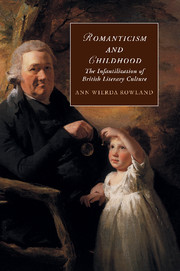23 results
Notes on contributors
-
-
- Book:
- William Wordsworth in Context
- Published online:
- 05 February 2015
- Print publication:
- 12 February 2015, pp ix-xvi
-
- Chapter
- Export citation
Chapter 14 - The popular tradition
- from Part III - Literary traditions
-
-
- Book:
- William Wordsworth in Context
- Published online:
- 05 February 2015
- Print publication:
- 12 February 2015, pp 119-126
-
- Chapter
- Export citation
Part II - Prattle and trifles
-
- Book:
- Romanticism and Childhood
- Published online:
- 05 June 2012
- Print publication:
- 24 May 2012, pp 159-261
-
- Chapter
- Export citation
Acknowledgments
-
- Book:
- Romanticism and Childhood
- Published online:
- 05 June 2012
- Print publication:
- 24 May 2012, pp vi-viii
-
- Chapter
- Export citation
Chapter 6 - The layers and forms of the child's mind
- from Part II - Prattle and trifles
-
- Book:
- Romanticism and Childhood
- Published online:
- 05 June 2012
- Print publication:
- 24 May 2012, pp 224-261
-
- Chapter
- Export citation
Chapter 3 - Becoming human
- from Part I - History of an analogy
-
- Book:
- Romanticism and Childhood
- Published online:
- 05 June 2012
- Print publication:
- 24 May 2012, pp 109-158
-
- Chapter
- Export citation
Copyright page
-
- Book:
- Romanticism and Childhood
- Published online:
- 05 June 2012
- Print publication:
- 24 May 2012, pp iv-iv
-
- Chapter
- Export citation
Contents
-
- Book:
- Romanticism and Childhood
- Published online:
- 05 June 2012
- Print publication:
- 24 May 2012, pp v-v
-
- Chapter
- Export citation
Chapter 5 - One child's trifle is another man's relic
- from Part II - Prattle and trifles
-
- Book:
- Romanticism and Childhood
- Published online:
- 05 June 2012
- Print publication:
- 24 May 2012, pp 194-223
-
- Chapter
- Export citation

Romanticism and Childhood
- The Infantilization of British Literary Culture
-
- Published online:
- 05 June 2012
- Print publication:
- 24 May 2012
Chapter 2 - Infancy, poetry and the origins of language
- from Part I - History of an analogy
-
- Book:
- Romanticism and Childhood
- Published online:
- 05 June 2012
- Print publication:
- 24 May 2012, pp 67-108
-
- Chapter
- Export citation
Introduction: The infantilization of British literary culture
-
- Book:
- Romanticism and Childhood
- Published online:
- 05 June 2012
- Print publication:
- 24 May 2012, pp 1-22
-
- Chapter
- Export citation
Series page
-
- Book:
- Romanticism and Childhood
- Published online:
- 05 June 2012
- Print publication:
- 24 May 2012, pp ii-ii
-
- Chapter
- Export citation
Bibliography
-
- Book:
- Romanticism and Childhood
- Published online:
- 05 June 2012
- Print publication:
- 24 May 2012, pp 285-297
-
- Chapter
- Export citation
Chapter 4 - Retentive ears and prattling mouths
- from Part II - Prattle and trifles
-
- Book:
- Romanticism and Childhood
- Published online:
- 05 June 2012
- Print publication:
- 24 May 2012, pp 161-193
-
- Chapter
- Export citation
Chapter 1 - The child is father of the man
- from Part I - History of an analogy
-
- Book:
- Romanticism and Childhood
- Published online:
- 05 June 2012
- Print publication:
- 24 May 2012, pp 25-66
-
- Chapter
- Export citation
Index
-
- Book:
- Romanticism and Childhood
- Published online:
- 05 June 2012
- Print publication:
- 24 May 2012, pp 298-305
-
- Chapter
- Export citation
Part I - History of an analogy
-
- Book:
- Romanticism and Childhood
- Published online:
- 05 June 2012
- Print publication:
- 24 May 2012, pp 23-158
-
- Chapter
- Export citation
Romanticism and Childhood - Title page
-
-
- Book:
- Romanticism and Childhood
- Published online:
- 05 June 2012
- Print publication:
- 24 May 2012, pp iii-iii
-
- Chapter
- Export citation
Notes
-
- Book:
- Romanticism and Childhood
- Published online:
- 05 June 2012
- Print publication:
- 24 May 2012, pp 262-284
-
- Chapter
- Export citation



